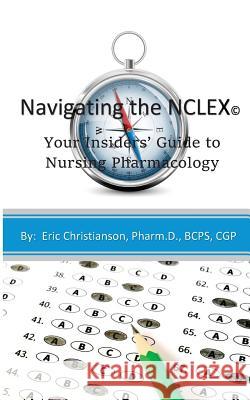Navigating the NCLEX: Your Insiders' Guide to Nursing Pharmacology » książka
Navigating the NCLEX: Your Insiders' Guide to Nursing Pharmacology
ISBN-13: 9781535243612 / Angielski / Miękka / 2016 / 288 str.
Pharmacology is tough. To improve your chances of passing the NCLEX(c), you need to have a basic understanding of pharmacology. Not only can learning pharmacology help you pass the NCLEX(c), understanding pharmacology can save the lives of your patients. I've spent the last 10+ years of my life learning and more importantly applying pharmacology. I've given dozens of presentations on various medication related topics to hundreds of nurses. I've been quoted in the American Journal of Nursing, Wall Street Journal, and my educational website meded101.com is acknowledged on The National Association Directors of Nursing Administration website. I work with nurses daily and understand the struggle of learning pharmacology. I've taken nursing pharmacology in college, and went on to obtain my Pharm.D. from one of the top rated pharmacy schools in the nation. I have a passion for simplifying complex topics and a soft spot in my heart for nurses who do many things that I can't. So, what's special about this study guide? 1. I've taken the top 200+ most commonly prescribed medications and given you ESSENTIAL and RELEVANT information about each of the drugs. 2. To ensure you're prepared for the NCLEX(c), I've had nurses who've passed the NCLEX(c) review the content to provide feedback on what information is important for (future) nurses preparing to sit for the exam to commit to memory. 3. As a bonus, you get access to the 60 in 60 Study Guide. I breakdown 60 common medication classes with my top 3-5 bullet points that you can get through in 60 minutes or less. 4. The information is relevant to clinical practice. I work with physicians, nurses, and other pharmacists on a daily basis and have learned a ton from them. You will find nuggets from experience throughout the book. 5. The medications are all hyperlinked/noted by generic name in the index This allows for easy access to whichever drug or drug class you need to focus on. I would recommend learning by generic name as this was recently stated about drug names on the NCLEX(c), "the NCLEX(c) examination will reflect, on most occasions, the use of generic medication names only." How should you use this study guide? Drugs can do wacky things to patients. I know it, and I've seen it. However, those "wacky" things that happen once in a career is not what I'm trying to teach you. You will also not likely be tested on those things. I'm trying to teach you the stuff that happens day after day. Remember, I'm going to provide you the ESSENTIALS to preparing for the NCLEX(c) and/or your pharmacology courses. This is not intended to be a package insert that lists 45 (exaggeration, but not really) side effects with each medication. There is no doubt this will help prepare you to pass the pharmacology section of the NCLEX NCLEX(c), NCLEX-RN(c), and NCLEX-PN(c) are registered trademarks of the National Council of State Boards of Nursing, Inc. and hold no affiliation or endorsement with t
Zawartość książki może nie spełniać oczekiwań – reklamacje nie obejmują treści, która mogła nie być redakcyjnie ani merytorycznie opracowana.











